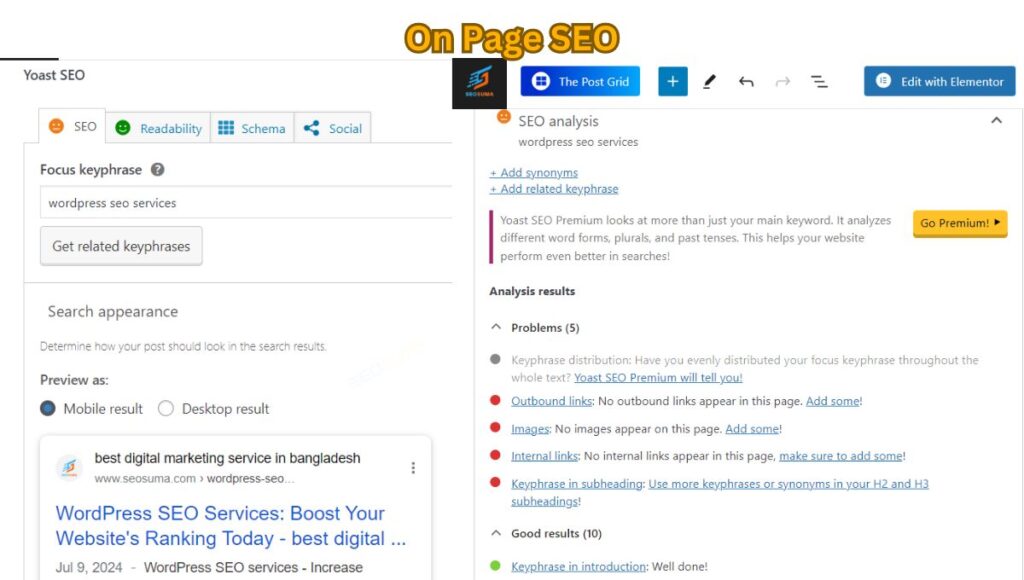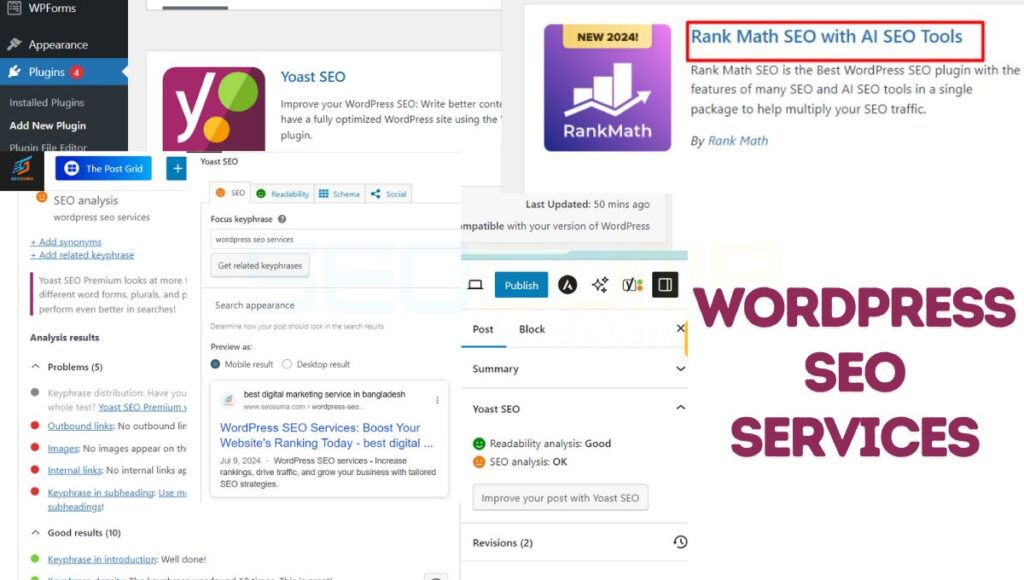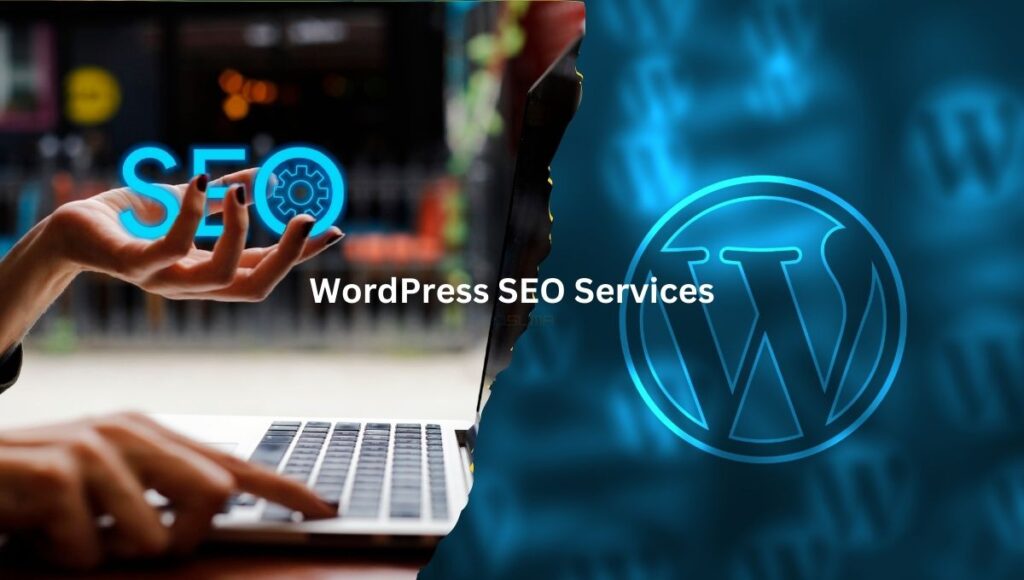WordPress SEO services optimize your website for search engines. They improve visibility, rankings, and organic traffic.
WordPress SEO services play a crucial role in enhancing your website’s performance on search engines. These services encompass various techniques like keyword optimization, meta tag creation, and content improvement to ensure your site ranks higher in search results. Effective SEO increases organic traffic, leading to more visitors and potential customers.
SEO experts use tools and strategies tailored to WordPress to enhance site speed, mobile-friendliness, and overall user experience. Investing in professional WordPress SEO services can significantly boost your online presence, making your website more competitive in your niche. This results in increased brand visibility and greater business opportunities.
Introduction To WordPress SEO
WordPress is a popular platform for creating websites. But having a website is not enough. You need to optimize it for search engines. This is where WordPress SEO services come in. SEO helps your site rank higher in search results. This means more visitors and potential customers.
Importance Of SEO
SEO stands for Search Engine Optimization. It helps search engines understand your site. Without SEO, your site may not appear in search results. This means fewer visitors.
SEO makes your site more visible. It helps you reach the right audience. Good SEO practices improve user experience. This keeps visitors on your site longer.
SEO also builds trust. High-ranking sites seem more credible. People are more likely to visit trusted sites.
Benefits For WordPress Sites
WordPress makes SEO easier. It has many built-in tools for optimization. Plugins like Yoast SEO offer great features. They help you optimize content and keywords.
WordPress sites can be easily customized. This allows better on-page SEO. You can adjust meta tags, headers, and URLs.
WordPress is mobile-friendly. Mobile optimization is crucial for SEO. Google ranks mobile-friendly sites higher.
Here are some key benefits:
- Easy Integration: WordPress integrates with many SEO tools.
- Customization: You can easily customize SEO elements.
- Mobile Optimization: WordPress supports mobile-friendly designs.
- Community Support: There is a large community for help and plugins.
SEO improves your site’s visibility and credibility. It attracts more visitors and potential customers. For WordPress sites, SEO is both easy and essential.
Keyword Research
Keyword Research is a crucial part of WordPress SEO services. It helps you find terms people use to search for your content. Proper keyword research can boost your website’s visibility and drive organic traffic.
Finding Relevant Keywords
Start by identifying words and phrases related to your content. Think about what your audience might search for. Make a list of these potential keywords.
- Brainstorm ideas based on your niche.
- Look at competitors’ websites for keyword inspiration.
- Use Google’s auto-suggest feature for more ideas.
Once you have a list, refine it by checking each keyword’s relevance. Focus on terms that match your content and audience.
Using Keyword Tools
Keyword tools help you find the best keywords to use. They provide data on search volume, competition, and trends.
Here are some popular keyword tools:
| Tool | Features |
| Google Keyword Planner | Offers search volume and competition data. |
| SEMrush | Provides keyword difficulty and competitive analysis. |
| Ahrefs | Gives insights on keyword trends and traffic potential. |
Use these tools to analyze your keyword list. Check each term’s search volume and difficulty. Select keywords with high volume and low competition.
Keyword Research is essential for effective WordPress SEO services. By finding relevant keywords and using keyword tools, you can enhance your website’s visibility and attract more visitors.

On-page SEO
On-Page SEO is crucial for your WordPress site. It helps search engines understand your content. Proper on-page SEO can boost your rankings. Here are some key aspects of on-page SEO.
Optimizing Titles And Meta Descriptions
Titles and meta descriptions are essential. They appear in search results. Your title should be catchy and relevant. It must include your primary keyword. Keep it under 60 characters.
Meta descriptions give a brief summary. They should also include your keyword. Keep them under 160 characters. A good meta description can improve click-through rates.
| Element | Best Practices |
| Title | Include primary keyword, keep under 60 characters |
| Meta Description | Include primary keyword, keep under 160 characters |
Using Header Tags Effectively
Header tags structure your content. They guide search engines and readers. Use
for the main title. Use
for subheadings. Use
for further sections.
Include keywords in your headers. This helps search engines understand your content. It also makes your content more readable.
- H1: Main title, use once per page
- H2: Subheadings, use for key sections
- H3: Subsections, use for detailed points

Content Optimization
Content optimization is key to improving your website’s visibility. It involves enhancing the quality and relevance of your content. This helps search engines understand and rank your site better.
Creating High-quality Content
High-quality content is essential. It engages readers and provides value. Readers stay longer on your site, reducing the bounce rate.
Here are some tips to create high-quality content:
- Understand your audience’s needs.
- Use clear and simple language.
- Provide accurate information.
- Include relevant images and videos.
- Keep paragraphs short and readable.
Incorporating Keywords Naturally
Incorporating keywords naturally is crucial. It helps search engines understand your content.
Follow these steps to use keywords effectively:
- Identify relevant keywords for your topic.
- Include keywords in the title and headings.
- Use keywords in the first 100 words.
- Distribute keywords evenly throughout the content.
- Avoid keyword stuffing.
Here’s a table for quick reference:
| Step | Description |
| 1 | Identify relevant keywords |
| 2 | Include in title and headings |
| 3 | Use in the first 100 words |
| 4 | Distribute evenly |
| 5 | Avoid keyword stuffing |
Follow these tips for better content optimization. Your site’s SEO will improve, attracting more visitors.
Technical SEO
Technical SEO ensures your WordPress site is optimized. It focuses on backend improvements. These improvements help search engines crawl and index your site. Technical SEO is crucial for better rankings and user experience.
Improving Site Speed
Site speed is vital for both users and search engines. A faster site improves user satisfaction. It also helps in achieving better rankings. Here are ways to improve site speed:
- Use a reliable hosting provider
- Optimize images for web
- Minify CSS, HTML, and JavaScript files
- Enable browser caching
- Use a Content Delivery Network (CDN)
Implement these steps to make your site faster. A faster site keeps visitors engaged longer.
Ensuring Mobile-friendliness
A mobile-friendly site is essential today. Many users browse the web on their phones. Google also favors mobile-friendly sites. Ensure your WordPress site is mobile-friendly by:
- Using a responsive theme
- Testing your site on different devices
- Optimizing images and content for small screens
- Improving mobile site speed
- Ensuring buttons and links are easy to click
These steps will make your site user-friendly on all devices. A mobile-friendly site attracts more visitors.
Link Building
Link building is crucial for improving your WordPress site’s SEO. It enhances your site’s authority and boosts search engine rankings. Effective link building involves both internal and external linking strategies.
Internal Linking Strategies
Internal linking helps search engines understand your site’s structure. It also keeps users engaged by guiding them to related content.
Here are some key internal linking strategies:
- Use Descriptive Anchor Text: Ensure your anchor text is relevant to the linked content.
- Link to High-Value Pages: Direct links to your most important pages.
- Update Old Content: Add links to new articles in older posts.
- Create Content Hubs: Group related posts into clusters with a central hub.
Earning Backlinks
Backlinks from other websites enhance your site’s credibility. They are critical for higher search engine rankings.
Follow these methods to earn quality backlinks:
- Guest Blogging: Write articles for other sites and include your links.
- Build Relationships: Network with industry influencers for link opportunities.
- Create Shareable Content: Develop content people want to link to and share.
- Use Social Media: Promote your content on social platforms to attract links.
Link building is essential for WordPress SEO success. It requires a strategic approach to both internal and external linking.
SEO Plugins For WordPress
WordPress is a powerful platform for building websites. To boost its performance, you need the right SEO plugins. These plugins help improve your site’s visibility on search engines. They also make SEO tasks easier for you.
Top SEO Plugins
Choosing the best SEO plugin is crucial. Here are some top picks:
- Yoast SEO: This is a favorite among many users. It offers features like keyword optimization, readability checks, and XML sitemaps.
- All in One SEO Pack: Another popular choice. It provides meta tag generation, XML sitemap support, and social media integration.
- Rank Math: Known for its user-friendly interface. It includes features like keyword tracking, schema markup, and Google Search Console integration.
- SEOPress: A comprehensive plugin. It offers content analysis, breadcrumb optimization, and redirection management.
Setting Up And Configuring Plugins
Proper setup and configuration are essential for SEO plugins. Follow these steps:
- Install the Plugin: Navigate to your WordPress dashboard. Go to Plugins > Add New. Search for your chosen plugin and click Install Now.
- Activate the Plugin: After installation, click Activate to enable the plugin.
- Basic Configuration: Each plugin has its setup wizard. Follow the prompts to configure basic settings like site type and primary keywords.
- Advanced Settings: Dive into advanced options. For Yoast SEO, go to SEO > General. For All in One SEO Pack, visit All in One SEO > General Settings.
- Content Optimization: Use the plugin to optimize your content. For Yoast SEO, check the readability and SEO analysis sections.
Here’s a quick comparison table of these plugins:
| Plugin | Key Features | Ease of Use |
| Yoast SEO | Keyword optimization, readability checks, XML sitemaps | Easy |
| All in One SEO Pack | Meta tag generation, XML sitemap support, social media integration | Moderate |
| Rank Math | Keyword tracking, schema markup, Google Search Console integration | Easy |
| SEOPress | Content analysis, breadcrumb optimization, redirection management | Moderate |
SEO plugins can greatly enhance your WordPress site’s performance. Make sure to choose one that fits your needs and set it up correctly.

Monitoring And Analytics
Monitoring and analytics are essential for effective WordPress SEO services. They help track the performance of your SEO strategies. This ensures your website ranks higher on search engines. Let’s explore key aspects of monitoring and analytics.
Tracking SEO Performance
Tracking SEO performance helps you understand what’s working. It also shows areas needing improvement. Use various tools to gather data. This data can include keyword rankings, page views, and bounce rates.
Key Metrics to Track:
- Keyword Rankings
- Organic Traffic
- Bounce Rate
- Conversion Rate
Consistent tracking lets you refine your SEO strategies. This leads to better results over time.
Using Google Analytics
Google Analytics is a powerful tool for monitoring website performance. It provides valuable insights into user behavior. This helps you understand how visitors interact with your site.
Steps to Use Google Analytics:
- Create a Google Analytics account.
- Add your website to the account.
- Install the tracking code on your site.
- Set up goals to track conversions.
With Google Analytics, you can track metrics like:
- Page Views
- Average Session Duration
- Traffic Sources
- Exit Pages
Use this data to enhance your SEO strategies. This ensures better user engagement and higher rankings.
Frequently Asked Questions
Does WordPress Offer SEO Services?
WordPress itself does not offer SEO services. However, many plugins and tools are available to optimize your site for search engines.
Can I Do SEO On WordPress?
Yes, you can do SEO on WordPress. Use plugins like Yoast SEO or All in One SEO. Optimize your content, use keywords, and ensure fast loading speeds. Regularly update your site for better rankings.
Is WordPress Still The Best For SEO?
Yes, WordPress remains one of the best platforms for SEO. It offers numerous plugins and SEO-friendly features.
Does WordPress Have SEO Tools?
Yes, WordPress offers built-in SEO tools. Additionally, various plugins like Yoast SEO and All in One SEO enhance optimization.
Conclusion
Enhancing your website with WordPress SEO services can boost visibility and drive organic traffic. Effective SEO strategies are essential for online success. By optimizing content and improving site performance, you can achieve higher search engine rankings. Invest in professional SEO services to stay ahead in the competitive digital landscape.

